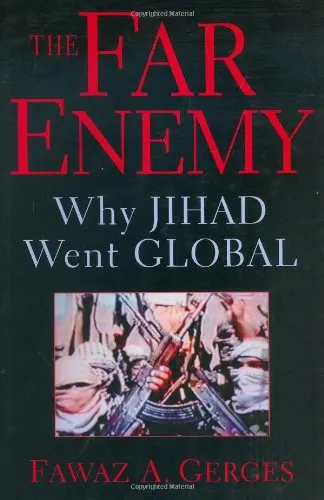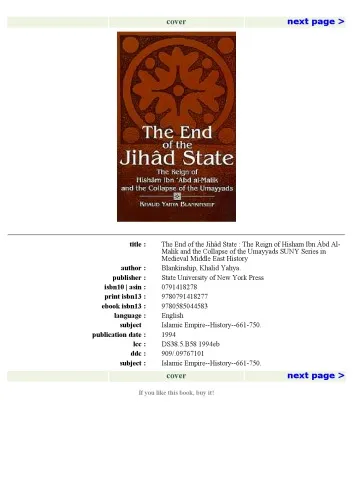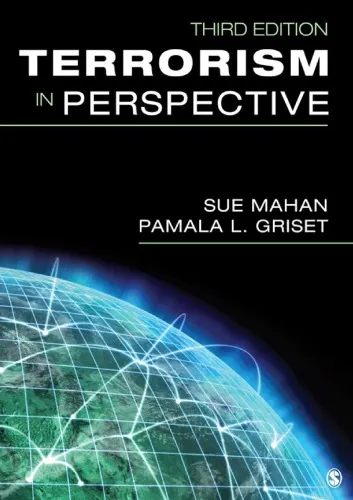Far enemy why jihad went global
4.0
بر اساس نظر کاربران

شما میتونید سوالاتتون در باره کتاب رو از هوش مصنوعیش بعد از ورود بپرسید
هر دانلود یا پرسش از هوش مصنوعی 2 امتیاز لازم دارد، برای بدست آوردن امتیاز رایگان، به صفحه ی راهنمای امتیازات سر بزنید و یک سری کار ارزشمند انجام بدینکتاب های مرتبط:
معرفی کتاب «Far Enemy: Why Jihad Went Global»
کتاب «Far Enemy: Why Jihad Went Global» نوشته فاواز جرجس نگاهی عمیق، علمی و جامع به روند جهانی شدن جهاد اسلامی ارائه میدهد. این کتاب تمرکزش را بر تفکرات، اختلافات و دگردیسیهایی میگذارد که جنبشهای زیرزمینی و سازمانهای جهادی، همانند القاعده، از طریق آنها تغییر کردند و به «دشمن دور» بجای «دشمن نزدیک» متمرکز شدند.
خلاصهای از کتاب
در این کتاب، فاواز جرجس یکی از مسائل کلیدی جهادیسم را بررسی میکند: چرا و چگونه دکترین آن از تمرکز بر دشمنان محلی در جهان اسلام (یا دشمن نزدیک) به دشمنان دور یعنی قدرتهای غربی، مخصوصاً ایالات متحده، گسترش یافت. او استدلال میکند که این تغییر رویکرد در واکنش به عوامل مختلفی رخ داد، از جمله سرکوب داخلی جنبشهای اسلامی توسط دولتهای منطقهای، شکستهای ایدئولوژیک و نظامی، و تضعیف توانایی نیروهای داخلی در مبارزه با قدرتهای سرکوبگر.
این کتاب همچنین به تحلیل اختلافات میان جهادگرایان بر سر اولویتها میپردازد. گروههایی مثل القاعده معتقد بودند که تمرکز بر دشمن دور، نظیر آمریکا، نیروهای داخلی را برای تحقق اهدافشان توانمند میکند. از سوی دیگر، سازمانهایی مانند Muslim Brotherhood بیشتر به جای تغییر جوامع جهانی بر دگرگونی در دولتهای اسلامی تمرکز میکردند.
جرجس با استفاده از منابع دست اول، همانند بیانیههای گروههای جهادی و مصاحبههای جامعی که با کارشناسان و افراد مطلع انجام داده، نشان میدهد که تفکر و دکترین جهاد طی دهههای اخیر به طور چشمگیری تکامل پیدا کرده است.
نکات کلیدی کتاب
- تحلیل عمیق تغییر از دشمن نزدیک به دشمن دور و پیامدهای آن.
- بررسی ویژگیهای فردی و ایدئولوژیک رهبران جهادی.
- ارزیابی سیاستهای غرب به عنوان محرکی برای گسترش خشونت جهادی.
- نقش اختلافات ایدئولوژیک در تقسیم جنبشهای اسلامی.
- ارائه چشماندازی تاریخی برای بررسی ظهور و سقوط القاعده و سایر گروههای مشابه.
نقل قولهای مشهور از کتاب
«تغییر دکترین از دشمن نزدیک به دشمن دور، نهتنها واکنشی نظامی بلکه یک راهبرد ایدئولوژیک بود که برای بقای جهاد جهانی مورد نیاز بود.»
«جنبشهای جهادی در حال مبارزه بین خودشان بودند، درست به همان اندازهای که با دشمنان خارجی میجنگیدند.»
چرا این کتاب مهم است؟
اهمیت کتاب «Far Enemy: Why Jihad Went Global» تنها در تحلیلهای علمی و دانشگاهی آن نیست؛ بلکه این کتاب توانسته است درک ما از یکی از پیچیدهترین پدیدههای قرن حاضر را بهبود بخشد. فاواز جرجس با ارائه اسناد و مدارک محکم و تحلیلهای دقیق تاریخی، نشان داده که فهم دکترینها و انگیزههای جهادی تنها با بررسی عمیق ساختارهای محلی و جهانی ممکن است.
این کتاب برای تمامی علاقهمندان به تحولات خاورمیانه، مطالعات تروریسم و امنیت بینالملل، و سیاستهای جهانی، منبعی ارزشمند و ضروری است. همچنین این کتاب به روشن شدن تضادهای داخلی جنبشهای جهادی کمک کرده و نشان داده چگونه این شکافها تأثیر مستقیمی بر جهان مدرن داشتهاند.
Introduction to "Far Enemy: Why Jihad Went Global"
"Far Enemy: Why Jihad Went Global" by Fawaz A. Gerges is an insightful and meticulously researched work that examines the historical, ideological, and political evolution of the global jihad movement. In this book, Gerges illuminates the nuanced differences between local and global jihadism, dissects the motivations behind their expansion, and delves into the complex interplay of regional dynamics and global ambitions. The book is a vital resource for anyone seeking to understand the roots of modern terrorism, the internal disagreements among jihadist factions, and the profound implications it holds for global security and politics today.
Through vivid analysis and engagement with primary sources, including interviews and insights from the jihadist movement itself, Gerges dismantles simplistic narratives and provides readers with a nuanced understanding of why and how jihad went global. The book takes readers beyond sensationalist headlines and offers a detailed exploration of the ideological shifts within violent Islamist movements, contrasting the local focus of earlier jihadists with the transnational agenda of groups like al-Qaeda. With its compelling scholarship and critical perspective, "Far Enemy" is both a historical account and a theoretical framework for interpreting the ongoing phenomenon of global jihadism.
A Detailed Summary of the Book
At the heart of "Far Enemy" lies the contentious debate within the jihadist camp—known as the "near enemy versus far enemy" dichotomy. This debate reflects fundamental disagreements regarding priorities and targets. Historically, jihadist activities were directed against local regimes in the Muslim world, referred to as the "near enemy." These regimes were often seen as corrupt, un-Islamic, and subservient to Western interests. However, a faction within the jihadist movement began advocating for a shift in focus to the "far enemy"—Western powers, particularly the United States, seen as the primary enabler of oppressive Muslim governments.
Gerges traces the evolution of this strategic shift, exploring how groups like al-Qaeda grew from the fringes of the jihadist world to its center. He unpacks the key ideological battles, including the influence of figures such as Ayman al-Zawahiri and Osama bin Laden, who argued that attacking the "far enemy" would weaken the "near enemy" and spark a broader revolution within the Muslim world.
The book also provides historical context, discussing how the failures of jihadist groups to achieve success in local struggles led to frustration and the eventual globalization of jihad in the 1990s. By situating global jihadism within the broader socio-political and historical framework, Gerges offers readers a lens to understand how modern extremist movements operate and why they resonate among certain disillusioned populations.
Through case studies and evidence spanning decades, "Far Enemy" reveals the internal fractures and ideological inconsistencies within jihadism, emphasizing that it is not a monolithic movement but rather a collection of competing aspirations and strategies.
Key Takeaways from the Book
- The "near enemy" references Arab and Muslim governments viewed as illegitimate by jihadists, while the "far enemy" refers to Western powers, primarily the United States.
- The global jihad movement's rise was not a natural progression but the result of internal debates and the failures of local jihadist campaigns.
- Al-Qaeda's global strategy was not immediately embraced by all jihadist factions and faced substantial resistance within the movement.
- Global jihadism gained traction through opportunism, ideational leadership, and the exploitation of geopolitical conflicts, including the U.S. presence in Muslim-majority regions.
- Despite al-Qaeda's sensational rhetoric, its actions often backfired, alienating Muslim communities and reducing its legitimacy among the very populations it sought to mobilize.
Famous Quotes from the Book
"The shift from near enemy to far enemy constituted the most significant ideological and strategic transformation in the modern jihadist movement."
"Jihadism is not a monolithic belief system, but rather a diverse and contested tradition, riven by debate, disagreement, and contradictions."
"To understand why jihad went global, one must first understand why it struggled to succeed locally."
Why This Book Matters
"Far Enemy: Why Jihad Went Global" is a crucial book for policymakers, academics, journalists, and anyone seeking to comprehend the complexities of militant Islamism and its global manifestations. By dissecting the internal debates of jihadism and presenting a rich historical and cultural analysis, Gerges provides invaluable insights into an issue that continues to shape international affairs.
Unlike many other books on terrorism, Gerges does not simplify jihadism into a single narrative of religious fanaticism. Instead, he shows it as a fragmented and evolving movement influenced by geopolitical forces, ideological battles, and the unintended consequences of Western interventions. This nuanced portrayal helps to dispel myths and challenge stereotypes, encouraging readers to think critically about the roots and ramifications of jihadist violence.
As global conflicts remain a pressing issue of our time, "Far Enemy" serves as a guide to understanding the motivations and mechanics of transnational terrorism, making it an essential read for those who wish to grapple with the underpinnings of one of the most significant security challenges of the 21st century.
دانلود رایگان مستقیم
شما میتونید سوالاتتون در باره کتاب رو از هوش مصنوعیش بعد از ورود بپرسید
دسترسی به کتابها از طریق پلتفرمهای قانونی و کتابخانههای عمومی نه تنها از حقوق نویسندگان و ناشران حمایت میکند، بلکه به پایداری فرهنگ کتابخوانی نیز کمک میرساند. پیش از دانلود، لحظهای به بررسی این گزینهها فکر کنید.
این کتاب رو در پلتفرم های دیگه ببینید
WorldCat به شما کمک میکنه تا کتاب ها رو در کتابخانه های سراسر دنیا پیدا کنید
امتیازها، نظرات تخصصی و صحبت ها درباره کتاب را در Goodreads ببینید
کتابهای کمیاب یا دست دوم را در AbeBooks پیدا کنید و بخرید
1362
بازدید4.0
امتیاز0
نظر98%
رضایتنظرات:
4.0
بر اساس 0 نظر کاربران
Questions & Answers
Ask questions about this book or help others by answering
No questions yet. Be the first to ask!















